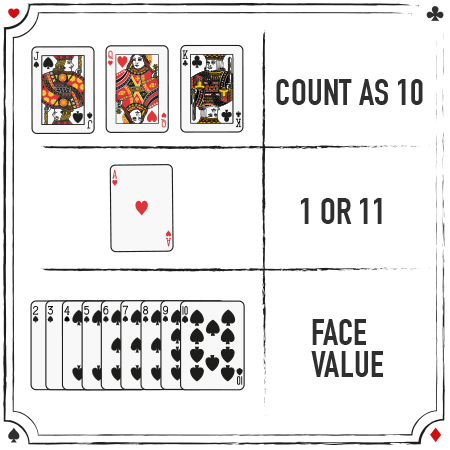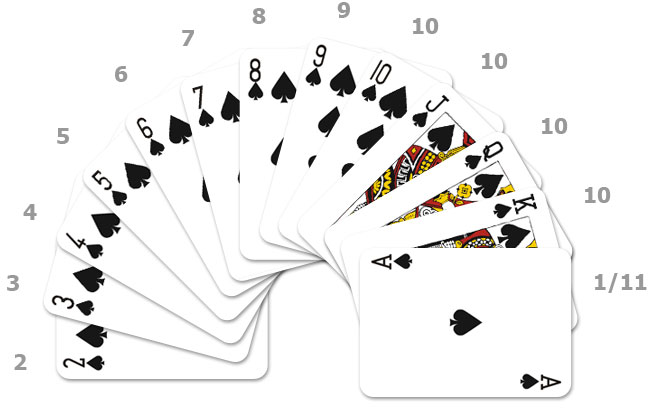Card Values In Blackjack
There exist enormous variations in Blackjack rules, but some of commonto nearly all casinos. The popularity of casino Blackjack has increasedgreatly over the last thirty years since it was discovered that this isthe one of the few casino games that can be regularly beaten with expertplay. Despite this, the casinos have profited handsomely because veryfew players have the patience to practice sufficiently to beat the casinos.Interestingly, Blackjack also provides one of the greatest advantagesfor the casino when a bad player plays. This section contains a briefdescription of the basic casino Blackjack rules. For additional Blackjackrules see Blackjack Rule Variations.
Standard values in a game of Blackjack are: Face cards of the Jack, Queen and King are worth ten Cards two through ten are worth their face value The Ace has two possible values of either one or eleven depending upon the effect it will have on the player’s hand. Blackjack is played with 1 to 9 decks of 52 cards each. The values of the cards correspond to their numerical value from 2-10. All face cards (Jack, Queen, King) count 10 and the Ace either 1 or 11, as the holders desires. A score with an ace valued as 11 is named soft-hand. To card count properly, whether in an online blackjack game or in a casino, all that you are doing is keeping a running tally based on the face value of any cards revealed. Learn how to count. The whole point of the card game known as “Blackjack” is to attain a “hand value” of twenty-one, or as near to that figure as possible without going over (“bust”). In order to reach twenty-one the players and dealer all follow the same set of card values that can add up to the winning figure.
Blackjack Objective
A casino Blackjack game consists of a dealer and one to seven players.You do NOT play Blackjack against other players; You play against thedealer. In fact, other players are not relevant to your play. They aremainly a distraction. You are betting that you have a better hand thanthe dealer. The better hand is the hand where the sum of the card valuesis closer to 21 without exceeding 21. A hand that is greater than 21 isreferred to as 'busted' and automatically loses.
Card values
The value of cards two through ten is their pip value (two through ten).Face cards (Jack, Queen and King) are all worth ten. Aces can be worthone or eleven. A hand's value is the sum of the card values. Soft handsand hard hands exist. A soft hand contains an Ace that is being countedas eleven. (Remember, an Ace can count as one or eleven.) For example,if a hand has an Ace and a Six, this is a soft 17. This hand cannot bebusted by drawing another card. If a ten is drawn, the Ace would be countedas one instead of eleven, and the hand would still have a value of 17.However, this would now be a hard 17, because the Ace now counts as oneand an additional draw could cause a bust.
The Play
Once players have placed their bets, the deal begins. Players are eachdealt two cards, face up or down depending on the casino and the tableat which you sit. The dealer is also dealt two cards, normally one up(showing) and one down (hidden). The players are allowed to draw additionalcards ('hit' their hand) to improve their hands. When all ofthe players have finished, the dealer's hand is completed. The dealerplays by strict rules set by the casino. Generally, the dealer will drawadditional cards until the dealer hand is above hard 16. In some casinos,the dealer will hit a hand with 17 if it is a 'soft' hand. Thisis a bad Blcakjack rule.
Note: the dealer has an advantage because the players play first. Ifthe player busts, then the dealer does not need to risk a bust. On theother hand, players also enjoy an advantage because they get to see oneof the dealer's cards and are allowed to vary their play accordingly.Other player advantages will be explained below:
Blackjack or Natural
This Blackjack rule developed in the early part of last century definesa bonus for which the game was named. If the player's first two cardsadd to 21 (an Ace and a ten value card), this is called a 'Blackjack'or 'natural'. As long as the dealer does not also have a Blackjack,the player is guaranteed to win the hand and the payoff is 3:2 insteadof the normal 1:1. This is a valuable bonus that occurs about every 20hands. If the dealer also has a Blackjack, the hand is 'pushed'.That is, there is a tie and the player's chips remain in the bet box.
Hitting and Standing
Queen In Blackjack


Hitting refers to drawing additional cards. You may draw as many cardsas you wish as long as you do not pass 21. Standing refers to stayingwith the cards that you have.
Splitting Pairs
If your first two cards have the same value, you may split them intotwo hands. For example, two eights can be split into two hands each havingone eight. You can then play the two hands separately. You must add anadditional bet for the second hand. If you draw yet another card of thesame value, some casinos allow you to split into three hands (or evenfour with an additional eight). This is called a resplit. Most casinosimpose limitations when splitting two Aces. You can only draw one cardto each Ace, and you cannot get a Blackjack. Note: Blackjack rules likethis must be correctly used to obtain decent results.
Card Values In Blackjack
Doubling Down
An additional option, 'double down', allows you to double yourbet on your first two cards. You draw exactly one card with double down.This is common practice if you have a good hand that cannot be bustedand the dealer has a bad hand. Remember, because face cards all countas ten, there exist more cards with a value of ten than any other value.If the dealer has a six showing, there is a good chance that the dealerhas a 16. Since a dealer must draw with a 16, there is a good chance thatthe dealer will draw a card that carries the dealer hand over 21 causinga dealer bust. If you have an eleven (say a seven and a four), you cannotbust with one card. You are likely to end up with a good hand. This optionallows you to double your bet when you have a better than even chanceof winning.
Insurance
If the dealer's up card (the card that is showing) is an Ace, you areallowed to make an 'insurance' bet. This is a side bet thatthe dealer has a ten-value card as the down card giving the dealer a Blackjack.The dealer will ask for insurance bets from all players before the firstplayer plays. You make this bet by placing chips equal to half of yourcurrent bet on the 'insurance line' just above your cards. Ifthe dealer has a ten, the insurance bet pays 2:1. In some casinos, thedealer then peeks at the down card and pays or takes the bet immediately.In other casinos, the payoff waits until the end of the play. Note: ThisBlackjack rule should never be used by a Basic Strategy player.
Surrender
A few casinos allow an option referred to as 'Surrender'. Inthese casinos, you can Surrender a lousy hand before you have drawn anyadditional cards. You will lose half of your bet.
For additional Blackjack rules see BlackjackVariations.